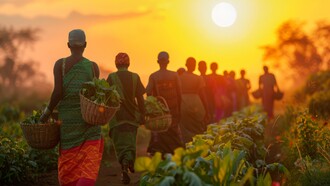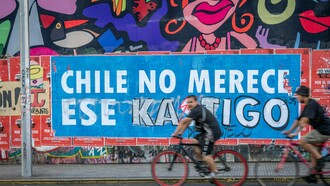She is 86 years old, with vibrant eyes, proud, and courageous with a clear voice of the Big Mom of the whole family, but still very shocked by the violent and sudden eviction and her shoulder is still sore after the eviction she suffered at the dawn of 27 May 2021. She knew she had unfairly lost her case in court, but she was evicted without any prior legal notice through a very brutal act, a real violation of someone's rights to keep one's home.
One month later, no authority has offered an alternative, decent, human rights compliant housing.
How come the state guardian of people’s health and wellness, could evict a woman of her age? With her two daughters 60 and 58 years old. Her son, 56 years old, was born there, married there and had his children there. Being precarious and vulnerable, her son had to sign an undertaking under threat in November 2020, to the police to leave the house in the middle of the pandemia, with his pregnant wife and three young children, and no longer live there with the risk of reprisals.
Grand-Ma Mehrzya has spent more than 60 years in that home, in the city of Ariana, the city of flowers. With no flowers anymore but in the midst of a pandemic, and now she has been infected with Covid-19 as well as one of her two daughters, Raoudha, with diabetes and asthma. Home is a shelter, a safe place from Covid, since they have been thrown away from it, all the risks were there.
1960, she said, the year she rented the house, newly married and so young. Ms. Mehrzya Trabelsi Idrissi, has taken on her burden the goods and the bad of life and still will do, but has always managed to keep her home clean, bright, fresh, with plants here and there to keep some shade in this small patio that has seen winters and summers go by, the smells of freshly ground spices on the ground drying, the women singing to bring good luck and hope for a good season to prepare for winter. It is not a common house, no, a home full of love, of problems too, but where all the family, friends, acquaintances were welcome to come to have supper, a cup of tea, a chat, a laugh, exchange, and organise their marriage too.
All this disappeared in a sudden, a nightmare, it's like a violent storm that crashes down, violently pushes, open the doors, shoves them, knocks Mehrzya down, handcuffs her with her two daughters, and their nephew under a rain of insults moved to two police stations, then separated and kept the nephew 48 hours in jail.
They are now homeless, with nothing, clothes, medicines and food behind a welded shut door. Even the one-week deadline for recovering one's belongings as stipulated by law was not respected by the police. Homeless, and depending on family and neighbours but solidarity is there, immediate, natural, a relay to ensure a continuous presence on the spot is set up, to prevent the police from emptying the furniture of the house, and a support committee is quickly formed and admirably organised, mainly young people and less young people who are disciplined, strategic, with a great sense of responsibility, taking risks, but always forging ahead because, by law, everybody knows that no owner has the right to sell without informing the tenant by offering to buy it back, especially those who live in a house since 1960 for more than 50 years.
Neither the governor of Ariana, a state representative, who ordered the eviction nor the Mayor, a local elected, who knew about the eviction, have offered help, assistance, or a dignified solution such as going back home at least momentarily till an alternative housing, dignified, sustainable and respectful of all human rights is found, e.g. an adequate social house. Yet they should know that Tunisia ratified the ICESCR in 1969, a legal obligation to protect the right to housing and health.
“Take her to the centre for the elderly”, said the Governor! and the daughters? The Mayor kept talking about cleaning the area, insinuating the permanent sit-in of the supporting committee in front of the house.
Tunisia, being in the full pandemic, the government has taken some measures to stop legal procedures that could lead to evictions, as requested by the Appeal of the International Alliance of Inhabitants and Médecins du Monde, signed by more than sixty personalities and important organizations in the country, at the very beginning of the pandemic.
Unfortunately, since the new government arrived no measures of a moratorium on evictions were taken, despite the scientific studies having shown their incidence of contagions and deaths.
As soon as we’ve been informed, we’ve launched a strong call, as International Alliance of Inhabitants - IAI in collaboration with the Tunisian Platform of Alternatives, to ask the Governor to immediately respect the obligations that Tunisia is violating (art. 11 and art. 12 ICESCR) and the intervention of the UN Special Rapporteur on the right to housing.
Ms. Mehrzya is the flower of resistance to evictions in Ariana, the city of flowers under attack by speculators. The forest of speculators tried to hide her to wipe her out, but she emerged, facing a worldwide way of earning more money on the shoulders of people, a dirty business of speculators linked to the regime, or even foreigners who are buying everywhere in the country. A forest of businessmen, under the hat of promoting smart cities, “gentrifiers” who are pushing out of the old city of Ariana, in this case, the families with low income, who have lived there for more than a half-century, owning or renting Moorish style houses or old colonial-style or 70s style apartments. This case is in the process of gentrification of the neighborhood. Others have been evicted in silence, out of shame they did not resist, here and their old houses are destroyed and replaced by ugly buildings.
This started years ago, slyly everywhere, to break up the homogenous poverty of neighborhoods in ways, they pretend, that can be good for all residents. New wealthier residents will demand improvements in schools and crime control, retail offerings and services will be improved for all residents with the promise of bringing new jobs, too. Gentrifiers, with the excuse of breaking a persistent, uniform and deep poverty with most streets characterized by dilapidated housing, failing schools, teenage pregnancy and heavy unemployment, with a culture of despair.
What should we call those who evict, taking advantage of people's poverty, even breaking the law?
Gentrifiers are only hurting low-income households by disrupting the social fabric of neighborhoods and potentially “pricing out” families.
Smart cities! Gentrification! Why not share the cities?
The neighborhood is resisting with Mehrzya and her daughters, the support committee was formed into an Alliance for the right to housing and the city. The struggle is only at its first steps.
Solidarity is the most powerful weapon to break the silence and vigorously ask the Government of Tunisia to give this family her home and to prevent further evictions through a moratorium. The International Alliance of Inhabitants IAI is inviting all to sign this international call for solidarity with the struggle of these courageous women and youth and encourage neighbors to resist.















